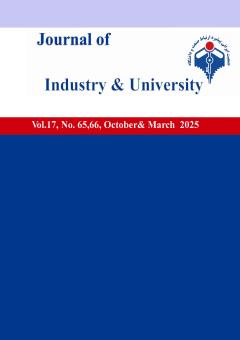The Missions of the Science Institution and Academic Community to Promotion and Discourse Building of the Progres Model
Subject Areas : عمومى
masoud shafiee
1
![]() ,
Reza Mahdi
2
*
,
Reza Mahdi
2
*
![]()
1 - Professor, Amirkabir University of Technology (AUT), Tehran, Iran
2 - Associate Professor, Institute for Social and Cultural Studies (ISCS), Tehran, Iran
Keywords: Model of Progress, Discourse-Building, Knowledge Promotion, University Mission, Science-Society Relationship,
Abstract :
The acceleration of developments in civilizational fields have made progress a complex, voluntary and conscious process based on valid and normative future research. In this complex process, the assets of countries are not enough to move on their own and end up well. A recommended criterion for nations seeking progress is to utilize all their civilizational capital and resources with maximum efficiency. Therefore, one of the general recommendations for streamlining the progress model is to discourse it based on all material and spiritual assets in the path of civilization and progress. The science institution and universities is one of the most important pillars of discourse on the progress model in the scope of a long-standing civilization and a great nation. Based on the fate of existing national documents, without discourse-building on a national scale with the participation of all influential institutions and individuals, including universities and higher education institutions, moving within the framework of the existing model will be difficult, with little or even impossible achievement. In this article, with a positive recommendation approach, the important mission of universities and the academic community in the discourse-building of the Iranian Islamic model of progress has been explained and described. Based on the central idea of this research, the higher education system and universities, including all members of the academic community and the university institution, must define and operationalize one of their missions in accordance with the three functions of education, research, and socio-cultural transformation, and general and specialized discourse-building of the progress model. The responsible participation of universities and academics in the promotion and discourse-building of the progress model has at least three special advantages, including the continuity and sustainability of achievements, public participation, and the comprehensiveness of the model on a national and civilizational scale
سیاهپوش، سید ابوتراب (1389)، ویژگیهای دانشگاه تمدنساز، فصلنامه جامعهپژوهی فرهنگی، سال اول، شماره 2، 122-105.
سارتُن، جورج (1949). مقدمه بر تاریخ علم، ترجمه غلامحسین صدری افشار، جلد یک، تهران، انتشارات علمی و فرهنگی.
مورن، ادگار (1990)، درآمدی بر اندیشه پیچیده، ترجمۀ افشین جهاندیده، تهران: نشر نی.
مهدی، رضا (1397). درآمدی بر تعامل دانشگاه با محیط پیرامون، تهران، مؤسسه مطالعات فرهنگی و اجتماعی.
مهدی، رضا (1401)، توسعۀ سازوکار تقسیمکار ملی برای آغاز فرایند اجرای الگوی پیشرفت، فصلنامه مطالعات کارآفرینی و توسعه پایدار کشاورزی، شماره 18، 52-39.
هندریکسون، آر. آم و همکاران (2013)، راهبری و رهبری علمی در نظام آموزش عالی، ترجمه دکتر سعید غیاثی ندوشن و دکتر رضا مهدی، تهران: نشر ویرایش، 1395.
هیرش، زد، ورنر و وبر لوک ای. (1381). چالشهای فراروی آموزش عالی در هزاره سوم، ترجمه گروه مترجمین بهکوشش رضا یوسفیان املشی، نشر دانشگاه امام حسین (ع).
یمنیدوزی سرخابی، محمد (1388)، دانشگاه سازگارشونده: یک فرایند پیچیده، رویکردها و چشماندازهای نو در آموزش عالی، تهران: مؤسسه مطالعات فرهنگی و اجتماعی.
Berberet, J. (2002). Nurturing an ethos of community engagement. New Directions for Teaching and Learning, 90, 91–100. doi:10.1002/tl.59.
Berkin, C. (2002). A brilliant solution: Inventing the American constitution. New York, NY: Houghton Mifflin Harcourt.
Boyer, E. (1990). Scholarship reconsidered: Priorities of the professoriate. Princeton, NJ: Carnegie Foundation for the Advancement of Teaching.
Boyer, E. (1996). The scholarship of engagement. Journal of Public Outreach, 1(1), 11–20. doi:10.2307/3824459. Carnegie Foundation for the Advancement of Teaching. Community engagement. Retrieved from http://classifications.carnegiefoundation.org/descriptions.
Colgan, C., & de Russy, C. (2006). Essays in perspective: Assessing the university president. Washington, DC: Institute for Effective Governance in Higher Education.
Dewey, J. (1916). Democracy and education: An introduction to the philosophy of education. New York, NY: Free Press.
Ellis, J. J. (2007). American creation: Triumphs and tragedies at the founding of the republic. New York, NY: Knopf.
Hendrickson, R. et al., (2013), Academic Leadership and Governance of Higher Education, USA, Stylus.
Hirsch W. & Weber L. (1999), Challenges facing Higher Education at the Millennium, Arisona: Oryex.
Jacoby, B., & Associates. (1996). Service-learning in higher education: Concepts and practices. San Francisco, CA: Jossey-Bass.
Jacoby, B., & Associates. (2009). Civic engagement in higher education: Concepts and practices. San Francisco, CA: Jossey-Bass.
Lane, J. E. (2005). Politics of mission creep: A framework for understanding the phenomena. Paper presented at the annual meeting of the Association for the Study of Higher Education, Philadelphia, PA.
Mahdi, Reza (2015), Evaluation of National Science and Technology Policies in Iran, Elsevier, Procedia - Social and Behavioral Sciences, 195, p. 210-219.
Maurrasse, D. J. (2001). Beyond the campus: How colleges and universities form partnerships with their communities. New York, NY: Routledge.
O’Meara, K. A., Terosky, A. T., & Neumann, A. (2009). Faculty careers and work lives: Professional growth perspectives. ASHE Higher Education Report, 34(3).
Putnam, R. D. (1995). Bowling alone: America’s declining social capital. Journal of Democracy, 6(1), 65–78. doi:10.1353/jod.1995.0002.
Putnam, R. D. (2000). Bowling alone: The collapse and revival of American community. New York, NY: Simon & Schuster.
Rudolph, F. (1962). The American college and university: A history. New York, NY: Random House.
Welzenbach, L. F. (1982). College and university business administration, Washington, DC: National Association for College and University Business Officers.

